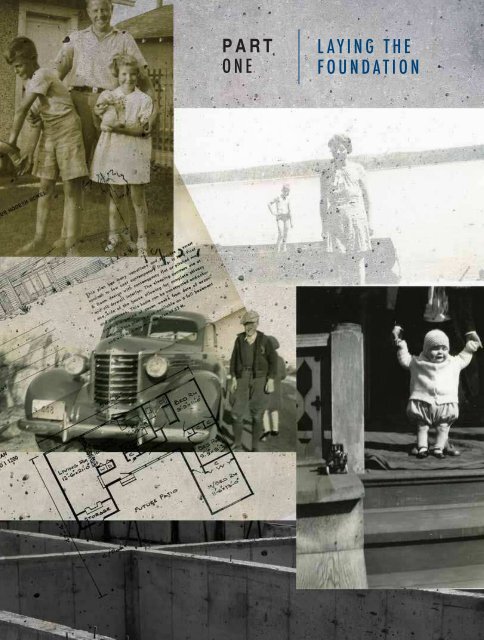Download The Keith Beedie Story - Beedie Group
Download The Keith Beedie Story - Beedie Group
Download The Keith Beedie Story - Beedie Group
You also want an ePaper? Increase the reach of your titles
YUMPU automatically turns print PDFs into web optimized ePapers that Google loves.
22<br />
THE KEITH<br />
BEEDIE STORY<br />
<strong>Keith</strong> took up<br />
caddying. He<br />
started out by<br />
walking the links<br />
with his mother.<br />
BELOW: Evelyn <strong>Beedie</strong> and her<br />
golf friends, out on the links,<br />
1939. Quilchena Golf Course.<br />
PART 1: LAYING THE FOUNDATION<br />
CHAPTER 1: A BEEDIE IS BORN<br />
KEEN TO MAKE A BUCK<br />
<strong>Keith</strong> was motivated to earn money for the war effort, but he was also<br />
eager from a young age to fi nd ways to make money for himself. <strong>Keith</strong><br />
had always wanted a bike. He’d been a stamp collector as a little boy<br />
in Regina, but ended up trading all his stamps away in exchange<br />
for rides on a friend’s bike. Once in Vancouver, <strong>Keith</strong>’s father was<br />
unwilling to offer his son an allowance, but he did propose a modest<br />
fee in return for household chores. “He wanted me to learn the value of<br />
a dollar,” says <strong>Keith</strong>.<br />
In addition to odd jobs around the house, <strong>Keith</strong> took up caddying. He<br />
started out by walking the links with his mother. She showed him the<br />
game and taught him all about club selection. His mother was runnerup<br />
to city champion one year and golfed every moment she could, so<br />
she knew everyone at the local course. She introduced him around and<br />
soon he had as much caddying work as he wanted. He got 50 cents per<br />
round, plus tips. He enjoyed being outdoors and listening to business<br />
being done as the men played. It was better than selling lemonade on<br />
the sidelines. In those days caddies carried the bag.<br />
Soon <strong>Keith</strong> had saved up the money he needed to buy his own<br />
bike. His big day had fi nally arrived. “My father took me to<br />
the store and we looked at all the bikes that were lined up.<br />
Eventually Dad talked me into buying a bike called a<br />
Durkopp,” <strong>Keith</strong> says. “It was on sale for a good price,<br />
so I saved a few bucks. But it was a German-made bike<br />
and I sure got yelled at a lot as the war started. I sure<br />
would have liked to have a CCM like everybody else.”<br />
Despite some early misgivings about the bike’s brand<br />
and appearance, <strong>Keith</strong>’s new set of wheels opened up<br />
a fresh world of earning opportunities.<br />
He took an aft er-school job as a prescription delivery<br />
boy for a drugstore at the corner of 37th and West<br />
Boulevard, a job he held for more than a year. “It felt<br />
like all I did was bike up and down hills,” says <strong>Keith</strong>.<br />
“I delivered mostly to the Women’s Hospital on Oak<br />
Street and the Willow Pavilion, between Oak and<br />
Cambie, rain or shine – mostly rain. It was quite a<br />
job.” In exchange, he received 20 cents an hour, plus<br />
free ice cream and chocolate bars. Eventually, he moved inside the<br />
drugstore as a soda jerk. His new position was warm and dry, and it<br />
came with a 5-cent-an-hour raise.<br />
Never one to take it easy, <strong>Keith</strong> also worked as a newspaper delivery<br />
boy, another job that took him into the West Side of Vancouver.<br />
He had a delivery route that covered homes between Arbutus and<br />
Granville and 15th Avenue to 25th Avenue. Most of the homes were<br />
on huge lots, many up hills with long, steep driveways. When the time<br />
came for the monthly payments, <strong>Keith</strong> had to knock on the kitchen<br />
doors out back, oft en being told by the maids to come back for lack of<br />
cash. “It was awful,” <strong>Keith</strong> says. “I had to pick up the papers at a local<br />
garage, then stack them in the bike basket on my handlebars,” says<br />
<strong>Keith</strong>. “Th ey weighed a ton, especially on Saturdays<br />
when they were full of fl yers. Th ere were no plastic bags<br />
in those days to keep them dry. We just packed them up<br />
and covered them in canvas to protect them.” Th e tower<br />
of heavy newspapers on the front of his bike made<br />
balancing and steering diffi cult, if not impossible. One<br />
rainy day, <strong>Keith</strong> lost control of his bike in the middle<br />
of the intersection of Granville and 25th. “Th ere was<br />
too much weight right over the handlebars and did I<br />
ever topple over. I was all right, but it was so bad that<br />
a motorist stopped to help me. He tried to pick up the<br />
papers, but it was no use, they were everywhere.” <strong>Keith</strong> did his best<br />
to gather up what he could, but the papers were strewn across the<br />
entire intersection and those he salvaged were soaking wet. He had<br />
no choice but to make his way back to the shack and make a call to<br />
<strong>Keith</strong> and Joan with their dog<br />
Spot, 1937.<br />
“I delivered mostly to the<br />
Womenʼs Hospital ...<br />
rain or shine – mostly rain.<br />
It was quite a job.”<br />
23


